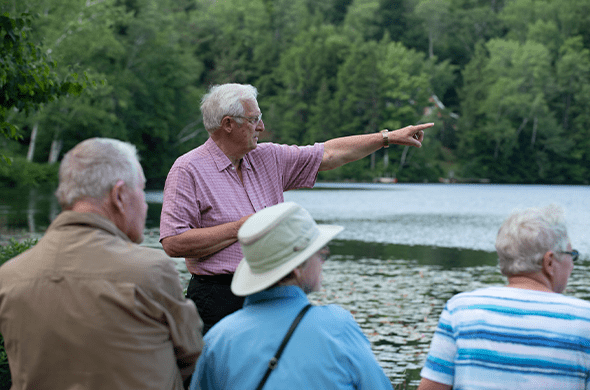Embedding Public Engagement with Science at Long Term Ecological Research Sites (PES@LTERs)
Project Overview:
 Embedding Public Engagement with Science at Long Term Ecological Research Sites (PES @ LTERs) is a research and development project funded by the National Science Foundation’s Advancing Informal STEM Learning (AISL) program. The goal of the project is to understand and embed public engagement with science into two long term ecological research sites in the northeastern US: the Hubbard Brook Experimental Forest in the White Mountains of New Hampshire, and the Harvard Forest in western Massachusetts.
Embedding Public Engagement with Science at Long Term Ecological Research Sites (PES @ LTERs) is a research and development project funded by the National Science Foundation’s Advancing Informal STEM Learning (AISL) program. The goal of the project is to understand and embed public engagement with science into two long term ecological research sites in the northeastern US: the Hubbard Brook Experimental Forest in the White Mountains of New Hampshire, and the Harvard Forest in western Massachusetts.
The big-picture vision driving the PES @ LTERs project is to investigate public engagement with science as a potentially transformative force on the cultures, practices, and institutions of science. Because the research programs at Harvard Forest and Hubbard Brook have already established strong foundations in science communication, public engagement, and policy integration, the sites are ideal for pushing these fields forward and addressing important questions such as:
What are scientists’ goals for engagement? What are their attitudes and beliefs about engagement and how might these views change over time with experiences?
What are the impacts of multiple modes of engagement on both stakeholder and scientist participants?
What support mechanisms are needed at the institutional level to overcome barriers to engagement?
The PES @ LTERs project links social science research and program evaluation with the development and implementation of several activities over a three-year period. These activities include:
Principal Investigators:
- Sarah Garlick, Hubbard Brook Research Foundation
- John Besley, Michigan State University
- Peter Groffman, City University of New York and the Cary Institute of Ecosystem Studies
- Kathy Fallon Lambert, Harvard University
- Pamela Templer, Boston University
- Marissa Weiss, Harvard University
Collaborators:
- Alix Contosta, University of New Hampshire
- Anthea Lavallee, Hubbard Brook Research Foundation
- Shannon Rogers, University of New Hampshire
- Jonathan Thompson, Harvard University
- RMC Research Corporation
- Presentation at the 2020 Hubbard Brook Cooperators Meeting by John C. Besley
- Presentation at the 2019 Hubbard Brook Cooperators Meeting by John C. Besley
- Presentation at the 2018 Hubbard Brook Cooperators Meeting by John C. Besley
- Forest Science Dialogues poster from the 2016 Advancing Informal STEM Learning PI Conference in Bethesda, Maryland
Current Projects
We combine long-term monitoring with visionary experiments to advance our understanding of forest ecology.
